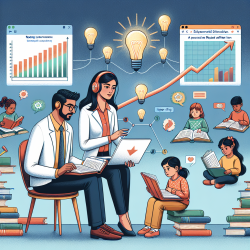In an era where technology is increasingly integrated into educational environments, school counselors have a unique opportunity to harness these tools to enhance their support for students. The adoption of online therapy services is a significant step towards providing comprehensive care that meets the diverse needs of children in today's digital age. As Special Education Directors, it is crucial to stay informed and proactive in utilizing these advancements to benefit our students and staff.
Online therapy, or teletherapy, has emerged as a powerful tool in the field of special education. This approach leverages digital platforms to deliver therapy services remotely, ensuring that students have access to the support they need, regardless of geographical constraints. For school counselors, this means a more flexible and inclusive way to address the emotional and psychological needs of students.
Here are several ways in which technology and online therapy can revolutionize the support system for students:
- Accessibility: Online therapy breaks down geographical barriers, making it possible for students in remote or underserved areas to receive high-quality therapeutic services. This is particularly beneficial for districts facing therapist staffing shortages.
- Flexibility: With online therapy, scheduling becomes more manageable. Sessions can be arranged at times that are convenient for both students and therapists, reducing the likelihood of missed appointments.
- Personalized Care: Digital platforms often come with tools that allow for tailored therapy plans. These can be adjusted in real-time based on the student's progress, ensuring that each child receives the most effective support possible.
- Data-Driven Insights: Technology enables the collection and analysis of data on student progress. This information can be used to fine-tune therapy approaches and demonstrate the effectiveness of interventions to stakeholders.
- Engagement: Many online therapy platforms incorporate interactive elements that can make sessions more engaging for students. This can be particularly beneficial for children who may find traditional therapy settings intimidating or unappealing.
For school counselors, integrating online therapy into their practice requires a strategic approach. Here are some steps to consider:
- Assess Needs: Evaluate the specific needs of your student population to determine how online therapy can best be utilized.
- Choose the Right Platform: Select a reputable online therapy provider that offers the services and features that align with your school's requirements.
- Train Staff: Ensure that school counselors and other relevant staff members are trained in using the online therapy platform effectively.
- Engage Parents: Communicate with parents about the benefits of online therapy and how it will be implemented to support their children.
- Monitor and Evaluate: Continuously monitor the effectiveness of online therapy services and make adjustments as needed based on feedback and data.
As we move forward, the integration of technology in education, particularly in the realm of special education and therapy services, is not just an option but a necessity. By embracing online therapy, school counselors can provide more accessible, flexible, and effective support for their students. This approach not only addresses current challenges but also sets the stage for a more inclusive and supportive educational environment in the future.
For those interested in exploring online therapy jobs or seeking to implement these services in their schools, staying informed through conferences, publications, and webinars is essential. Networking with other professionals in the field can also provide valuable insights and best practices.
In conclusion, the use of technology in delivering therapy services offers a transformative potential for special education. By leveraging online therapy, school counselors can ensure that all students receive the care and support they need to thrive, regardless of their circumstances.










